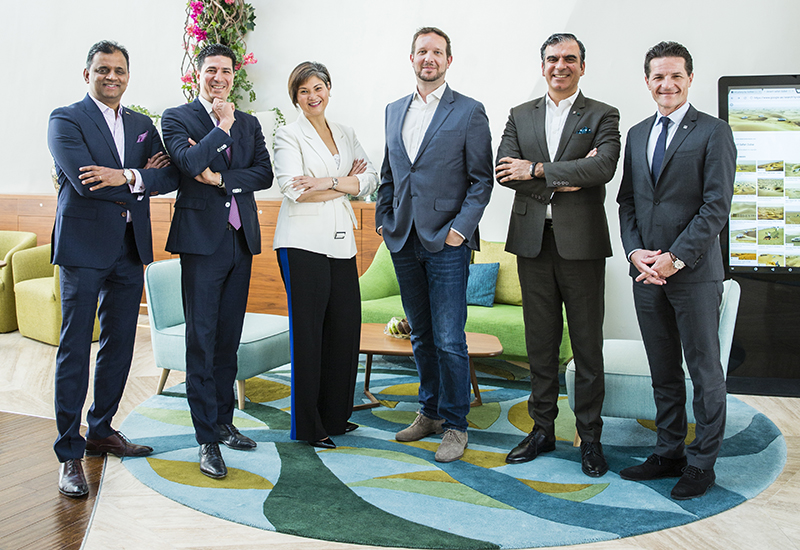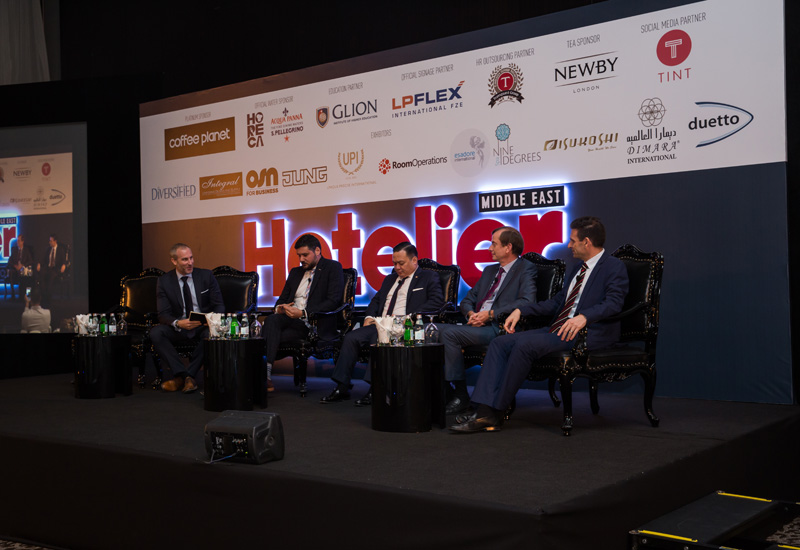 (From L-R) Siddhartha Sattanathan, General Manager, Radisson Blu Hotel Ajman; Omar Souab, General Manager, Fairmont Fujairah Beach Resort; Patria Puyat, General Manager, Holiday Inn Dubai Festival City; Andreas Plum, General Manager, Aloft Al Ain; Samir Arora, General Manager, The Retreat Palm Dubai MGallery by Sofitel and Olivier R. Harnisch, Chief Executive Officer, Emaar Hospitality Group.
(From L-R) Siddhartha Sattanathan, General Manager, Radisson Blu Hotel Ajman; Omar Souab, General Manager, Fairmont Fujairah Beach Resort; Patria Puyat, General Manager, Holiday Inn Dubai Festival City; Andreas Plum, General Manager, Aloft Al Ain; Samir Arora, General Manager, The Retreat Palm Dubai MGallery by Sofitel and Olivier R. Harnisch, Chief Executive Officer, Emaar Hospitality Group.
HOTELIER: What about occupancy and rates right now?
ANDREAS: Abu Dhabi has 20% more visitors than three years ago but less average spend coming in.
SAMIR: How do we deliver service standards and quality and luxury going forward because everything is getting squeezed; there’s very little margin to manoeuvre now. Efficiency — that’s a whole paradigm shift we have to bring.
ANDREAS: …while still meeting expectations. And that’s where the Rove got it right and I still don’t know how they’ve done it! But in many four-star hotels, customers are still expecting full bathroom amenities, slippers, mini-bars, 24-hour room service which you can’t necessarily deliver in an AED 150 hotel — the expectations are the same and that comes back to feeder markets. If you’re clear and upfront about it, very few people walk in and expect luxury. Lot of customers come in, and say it needs to be luxury.
OLIVIER: It’s also about educating the customer. Some people come to Rove Hotel knowing it’s a mid-market hotel and their expectations are in line with that. Others expect to find a valet service, room service and we don’t offer that. It’s really important that when you have a defined mid-market product you stick to it. Because you water it down and you end up having a three-star rate with a five-star product.
PATRIA: Guests come in from the other properties [InterContinental and Crowne Plaza] and ask ‘why don’t we try?’ They’re waiting for people to get their bags and bring them up to the room.
OMAR: You still see a lot of five-star and luxury products coming up but the owners are trying to eventually look at the mid-market and mid-scale segments. You actually have owners who are questioning business models in the luxury hotels saying, maybe we will go for a brand that requires less costs and expenses. The mindset of the stakeholders is changing nowadays.
PATRIA: Owners are getting incentives for building [mid-market] and we are opening Staybridge in the same area. Plus we have other mid-market brands like Hotel Indigo opening in Business Bay and Sustainable City. For rates, we have guests coming in, but I don’t think the rates are coming in. Are we going to expect our average rates going up next year? I don’t think so. Hotels need to be more stringent in the way they operate and we need to figure out how to get owners the profits they need.
SAMIR: The biggest cost is payroll and that’s where flexibility and efficiencies need to come in. We need to think out of the box because traditionally it was ‘one man one job’, which sorely needs to change. It’s pretty evident in Europe and the western world, where the learning needs to come from. The other learning is Abu Dhabi — they have really achieved how you deliver luxury with those kinds of margins, compared to Dubai.
SIDDHARTHA: Before we get to the payroll, perhaps we should talk about planning a property well. Sometimes we are setting up hotels for failure. That’s the responsibility of all operators and the technical services team.
SAMIR: It starts with the feasibility studies. That’s where things are inflated. Then the expectations are skewed as you go down the line.
OLIVIER: It’s a change of mindset. It’s about construction and operating efficiency. I’ve seen hotels that are really well run, great margins but the return on investment is really low because the hotel is over invested. When we value engineer, we value engineer at the right places — not in the commercial areas but in the back-of-the-house. There are a lot of learnings in this respect. I’ve seen the same mistakes over 30 years. Hotels are emotional investments. When it’s a hotel everyone wants to have a view. Hotels end up over budget and when the accountants wake up, the project is so far advanced that 80% of the spend is committed. So when the value engineering starts, the only area we can do so is front-of-house. You end up with oversized kitchens and cheap chairs in restaurants. It’s unfortunate because this is what the guest is paying for. When we plan for hotels we need to have efficiencies right from the beginning. BOH should be as small as necessary. Do we need 3-4 restaurants? Do we need a destination spa? Because if you look at the yield of hotel construction, the most profitable area for ROI is the rooms. The hotel business is very profitable with 80% occupancy but when occupancy drops fast because our costs are too fixed — we need to convert them from fixed to variable.
OMAR: You see a lot of projects that were designed earlier but the projects take a bit of time and you see a lot of F&B offer, which is now being cut down. You start either to see the outsourcing trend or cancellations of restaurants. The other thing is payroll. We have to find synergies between multiple hotels — you see a lot of clustering. Either in the marketplace or between Emirates that are close to each other. The high positions are being clustered, then you try to be as lean as possible in the payroll, shift the restaurants into outsource and get a return on investment that the owners are expecting.
PATRIA: In DFC we operate as a cluster. IHG and I put together a manning guide which we are rolling across AMEA and it’s called Manning 2.0 where we hire one person for several jobs and not just one job. This is where we have blended synergies in front office; we just need front office colleagues. For Holiday Inn, we have manned ourselves at a 0.5 ratio between the 508 rooms that we have in operation.

| Advertisement |









 Search our database of more than 2,700 industry companies
Search our database of more than 2,700 industry companies









